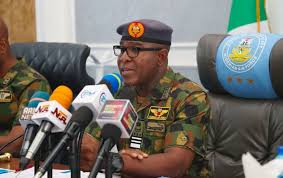After a period of relative calm, a resurgence in Boko Haram and Islamic State West Africa Province (ISWAP) attacks has reignited fears across Nigeria’s Borno and Yobe states. In recent weeks, the militant groups have launched a series of deadly assaults, including daring raids on military bases, killing soldiers, stealing weapons, and, in some instances, deploying drones during operations.
In an exclusive interview with Vanguard to mark the 61st anniversary of the Nigerian Air Force (NAF), Chief of Air Staff Air Marshal Hasan Bala Abubakar addressed the growing security challenges and the complexity of Nigeria’s counterinsurgency efforts. He highlighted the unpredictable nature of insurgency and the escalating cost of maintaining air superiority in a technologically evolving conflict zone.
“Insurgencies are long-term issues,” Abubakar stated, noting that the brief lull in violence was largely due to intensified military pressure in 2023, which led to a wave of mass surrenders. However, with attention shifting to banditry in the North West, insurgents in the North East have taken the opportunity to regroup. “The impression was that the North East had stabilized, but clearly, the threat remains,” he explained.
According to Abubakar, military action alone can only resolve about 25 to 30 percent of Nigeria’s security challenges. He emphasized the importance of non-kinetic strategies that tackle the root causes of radicalization—poverty, unemployment, and lack of social engagement. “Even when the military achieves success, without a whole-of-society approach, those efforts can quickly unravel,” he warned.
The Air Marshal stressed the need for stronger civil-military relations and revealed that the NAF is collaborating with state governments to implement community outreach initiatives, including free healthcare and educational programs.
Abubakar also addressed the economic strain of air operations, revealing the high costs involved. “A single missile fired from our Chinese-made UAV costs $150,000, and the bomb it carries costs around $95,000,” he disclosed. These figures exclude the costs of maintenance, fuel, and training, which can push operational expenses to between $10,000 and $30,000 per flight. “Running the Air Force is extremely expensive,” he said.
With insurgents now deploying drones against Nigerian forces, there are growing concerns about the NAF’s readiness to respond to such threats. Abubakar acknowledged that the adversaries are becoming more sophisticated, often modifying commercial drones for combat. He highlighted the urgent need for investment in radar coverage and artificial intelligence.
“We need comprehensive military radar coverage that can detect any unauthorized object in our airspace—low, mid, or high level. Unfortunately, we don’t have that yet,” he admitted. However, he noted that smaller counter-drone systems have been deployed in some military installations.
To strengthen local capacity, the NAF has partnered with international institutions. A recent Memorandum of Understanding was signed with the University of Bradford’s Centre for Artificial Intelligence to train Nigerian personnel and expand research into AI-driven defense solutions.
Responding to concerns about delays in deploying air support during ground attacks—such as the recent ambush in Marte, Borno State—Abubakar acknowledged that coordination remains a challenge. However, he noted that inter-service synergy is improving. To enhance collaboration, the NAF has established an Air-Ground Integration School to train personnel from different branches of the armed forces for more seamless operational coordination.
On manpower, Abubakar stated that while recruitment efforts have been approved, the real challenge lies in ensuring proper training, accommodation, and long-term management of personnel. “Recruiting is easy; managing the consequences of mass enlistment is the difficult part. We must avoid bringing in individuals who cannot be properly trained or integrated,” he cautioned.




